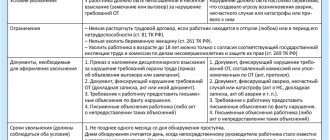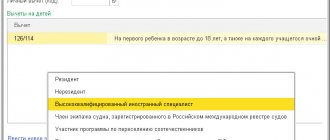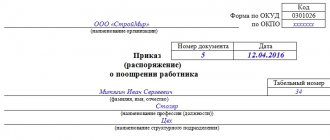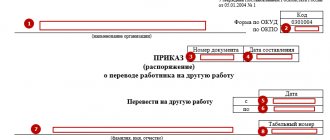Where, according to the Labor Code, does the employer establish the procedure for awarding bonuses and depriving them of bonuses?
The Labor Code allows you to set an employee’s salary, making it up of several parts (Article 129):
- payment for the work itself;
- additional payments for special working conditions;
- incentive payments, among which bonuses usually play a leading role.
If the first 2 parts are sufficiently regulated by law, then with regard to establishing bonus rules, the employer can act independently (Article 135 of the Labor Code of the Russian Federation), determining at its discretion:
- quantity, types and, accordingly, a specific list of bonuses paid;
- the frequency of their accrual and the circle of employees who will be entitled to one or another type of bonus;
- a list of those indicators, the fulfillment of which entails the emergence of the right to receive a bonus;
- a system for assessing the value of each type of bonus, the procedure for considering the results of this assessment and a procedure that allows an employee to challenge these results;
- grounds that serve as a reason for depriving an employee of a bonus.
Attention! Hint from ConsultantPlus It will not be a violation if you give an employee a one-time bonus for special work achievements, even if a special bonus procedure is not provided. This is your right... (read more about rewarding employees with money in K+). Trial access to K+ is free.
The Labor Code of the Russian Federation does not contain any restrictions for establishing bonus rules, obliging the employer only to:
- enshrine them in an internal regulatory act, without prohibiting the use of an employment agreement with a specific employee as such an act;
- coordinate the content of this act with representatives of the labor collective, and for state unitary enterprises and municipal unitary enterprises - with uniform recommendations developed by the Russian tripartite commission (consisting of representatives of the Government of the Russian Federation, trade unions and employers) on the regulation of social and labor relations;
- not to worsen the terms of remuneration of a particular employee in comparison with the developed normative act, and the conditions of this act - in comparison with the norms of labor law;
- familiarize each employee with the rules for bonuses against receipt.
Thus, establishing a procedure for depriving an employee of a bonus under the Labor Code of the Russian Federation means enshrining the rules of this procedure in the internal regulatory act on bonuses.
For information about which documents may establish bonus rules, read the materials: “The procedure for paying bonuses under the Labor Code of the Russian Federation” and “Accruing bonuses to an employee in different situations .
The article “Calculation of the quarterly bonus for actual time worked” will tell you how to calculate the bonus for the time actually worked and the peculiarities of its taxation.
What is included in the concept of “premium”
According to the law, the salary of an employee of an organization can consist of several parts: salary, various types of allowances, compensation and incentive payments. The bonus is just one of the types of material incentives. However, it is not strictly obligatory and depends entirely on the will of the enterprise management.
The director has the right to independently determine to whom, with what frequency and in what volume to issue bonuses.
Moreover, if an employer decides to use a bonus as an additional incentive payment to subordinates, he must indicate its presence in internal documentation, for example, a special regulatory act - the Regulations on Bonuses, or a collective labor agreement. It is also possible to include a bonus clause in individual employment contracts with employees.
Grounds for deprivation of bonuses - why are bonuses deprived at work?
What can you deprive of a bonus for? There are many reasons for non-payment of premiums. The reasons most often indicated in a regulatory act are:
- whether the employee has received a disciplinary sanction during the bonus period;
- the presence of a disciplinary offense during the bonus period (regardless of whether it entailed disciplinary action);
- dismissal during the bonus period;
- bonus period not fully worked out.
In addition, deprivation of a bonus can be carried out by decision of the manager, the right to which:
- or is enshrined in the internal regulatory act on bonuses as one or the only reason for non-payment of bonuses;
- or appears if the normative act on bonuses does not contain a description of the procedure for depriving the bonus.
The employer's participation in the reduction of bonuses for the reasons listed in the normative act can also be expressed in the fact that it determines what part of the total bonus amount the employee is deprived of the bonus.
Recommendations
When developing a local regulatory act on bonuses, try to take into account the following points:
- The bonus regulations must be detailed, clearly distinguishing between different types of bonuses.
- It is necessary to provide that bonuses are not a mandatory part of the salary and a guaranteed payment, but are an incentive payment.
- Establish clear indicators upon achievement of which the employee is guaranteed payment of a bonus (for example, fulfillment of the monthly plan, compliance with labor discipline, absence of defects in work, etc.).
- Establish the procedure for granting bonuses (for example, based on a memorandum from the manager, based on an issued order of the general director, etc.). It is also necessary to indicate the reasons why it is not paid.
- When issuing an order to assign a bonus or reduce a bonus, be sure to refer to the clauses of local acts that served as the basis for paying the bonus or reducing the size of the bonus.
Hello Guest! Offer from "Clerk"
Online professional retraining “Accountant on the simplified tax system” with a diploma for 250 academic hours . Learn everything new to avoid mistakes. Online training for 2 months, the stream starts on March 1.
Sign up
Is deprivation of a bonus a disciplinary sanction or not?
Is deprivation of a bonus a disciplinary sanction? In no case! The list of disciplinary sanctions is strictly defined by Art. 192 of the Labor Code of the Russian Federation - and deprivation of bonuses is not among them.
What types of disciplinary sanctions are there and how they are applied to employees, read the material “Types of disciplinary sanctions under the Labor Code of the Russian Federation.”
At the same time, a direct connection between disciplinary action and deprivation of bonuses, as a rule, exists, since the presence of this penalty among the reasons why an employee loses the right to bonuses occupies a leading position. However, a certain sequence must always be followed: first, a disciplinary sanction for an offense, and then the deprivation of a bonus due to the presence of this sanction.
Imposing a disciplinary sanction is a right, not an obligation of the employer (Article 22 of the Labor Code of the Russian Federation), that is, having considered the circumstances of the offense, he may not punish the employee. Then, in a situation where the manager makes a decision not to apply a disciplinary sanction for an offense committed, and an internal regulatory act provides for the deprivation of a bonus precisely for the presence of a penalty, the employee cannot be deprived of bonuses. But if a disciplinary offense is specified as a basis for deprivation of a bonus, then regardless of whether punishment follows, the employee will be left without a bonus.
A disciplinary offense and a disciplinary sanction are formalized according to certain rules that must be strictly observed so that the employee cannot challenge the established fact of the misconduct and the legality of the penalty and, accordingly, cannot claim that the deprivation of a bonus was unlawful on any of these grounds.
When can a premium be paid other than monthly?
If an enterprise has developed a local regulatory act (usually called “regulations on bonuses” or “regulations on material incentives for employees”) establishing the conditions for paying bonuses, then in accordance with Art.
191 of the Labor Code, this type of bonus is an incentive. The Constitutional Court of the Russian Federation has repeatedly explained that the bonus provided for in Art. 191 of the Labor Code of the Russian Federation, is the right of the employer, and not an obligation, and pays based on the remuneration system provided for at the enterprise (Determination of the Constitutional Court of the Russian Federation dated July 18, 2017 No. 1554-O). A bonus as a type of incentive for an employee to work conscientiously is more common at trade enterprises, where it depends on the company's sales and gives more freedom to the employer in determining the conditions for rewarding employees.
What may a local regulation stipulate that determines the need to pay a premium?
- performance indicators, upon achievement of which a bonus is paid.
There are cases where the employer refused to pay the bonus, since the performance indicators of the enterprise as a whole were 0% and the court took the employer’s position. The reason is that the local act of the enterprise stipulated that the monthly bonus is not a mandatory part of the salary and a guaranteed payment (resolution of the Supreme Court of the Russian Federation No. 69-KG 17-22 of November 27, 2017)
- from what means is the employee bonus fund formed?
Situations are possible when local acts of an enterprise provide for the formation of a bonus fund only if the current liquidity of the enterprise is ensured and the risks of bankruptcy of the organization are eliminated. (Appeal ruling of the Moscow City Court dated December 6, 2018 in case No. 33-52757/2018).
- grounds for depriving the bonus or reducing its size.
For example, failure to achieve performance indicators, the presence of disciplinary sanctions in a certain period. Please note that deprivation of a bonus in itself cannot be a disciplinary sanction.
- bonus amount (usually set as a percentage, but the employer is not deprived of the opportunity to set a fixed amount).
What to do if bonuses were deprived without reading the order?
Can an employer deprive a bonus without an order? Yes it is possible. In a situation where, in the internal regulatory act on bonuses, which the employee was promptly familiarized with on receipt, one of the reasons for deprivation of a bonus is the reason why he was not accrued a bonus for the corresponding period, there is no need to draw up a separate order. In this case, the reason must be documented - the basis for not accruing the bonus. An employee who does not agree with the fact that he was deprived of a bonus will have to challenge not the reason for its non-accrual, but the legality of the basis on which the deprivation became possible.
The presence of an order to reduce bonuses becomes mandatory when the decision not to pay a bonus to an employee is made by the employer. This is possible in the following situations:
- when the basis for deprivation of a bonus is not in the list given in the regulatory act on bonuses, but the same act gives the manager the right to make a decision on deprivation of bonuses;
- when the regulatory act on bonuses indicates a decision on this made by the manager as the only reason for deprivation of a bonus;
- when the manager has the right to establish the amount of the share by which the amount of bonuses is reduced upon the occurrence of the grounds provided for deduction of bonuses by the normative act;
- when the normative act on bonuses does not indicate the grounds for deprivation of the bonus at all.
Attention! Sample from ConsultantPlus See sample order for deprivation of bonus from K+. Get free trial access to K+ right now.
General information about the order
If you are faced with the task of drawing up an order to deprive an employee of a bonus, and you have not dealt with such a document before, use the recommendations below and look at a ready-made example of an order.
Before moving on to a detailed description of this specific order, we will talk about general points relevant to all such documents.
- Firstly, let's start with the fact that any order is always written on behalf of the director of the enterprise.
This is important because, regardless of who is directly involved in its formation, it must always be signed by the highest official of the company, or by an employee acting on his behalf. All employees specified in it must also be familiarized with the order against signature - in this way they record that they have read the order and agree to carry it out. - Secondly, today an order can be written in any form, but if the organization has an established form on the basis of which all other management orders must be written, then, of course, it is necessary to use it.
- Thirdly, the order can be made in electronic format or in handwritten form. In this case, you need to take into account only one point - the electronic form must be printed - for signatures. There is no need to stamp the order, except in cases where the requirement for the use of seals is in the company’s regulations.
- And finally, fourthly, the form must be made in one original copy .
Information about the order should be entered in the administrative documentation log, which should be in every company and is usually kept by the secretary or other responsible employee.
Can a pregnant woman be deprived of bonuses for being late?
Is it possible for a pregnant woman to be deprived of a bonus due to her violation of labor discipline, in particular due to being late? Yes, you can.
Pregnancy does not give the right to any special treatment for a woman expecting a child. Therefore, if a violation of labor discipline (i.e., a disciplinary offense) has occurred and this basis is present among the reasons indicated in the internal regulatory act as leading to the deprivation of a bonus, then a deprivation of bonuses will certainly follow.
It may not exist if the regulatory act specifies the presence of a disciplinary sanction as a basis for non-payment of bonuses. In this case, if when committing an offense there is no decision on punishment for it, there will be no deprivation of the bonus.
Misdemeanors for deprivation
Deprivation of bonuses is the deprivation of an employee of additional monetary payments or part thereof. Carried out on the basis of an order. It is illegal to withhold employee bonuses without authorization. All requirements and conditions for calculating or depriving a monthly bonus are prescribed in the local regulations of the enterprise.
The internal regulatory act approves a sample notice of deprivation of bonuses, which should be used in the future to inform management. Employees are deprived of bonuses in whole or in part due to failure to comply with certain work conditions or the presence of a disciplinary sanction. In practice, the following are most often deprived of bonuses:
- for failure to complete the agreed scope of work;
- violation of internal labor regulations (ILR);
- failure to fulfill the sales plan;
- being late for work;
- failure to perform official duties;
- for violation of reporting deadlines;
- unauthorized leaving of the workplace without notifying management for 4 or more hours;
- a reprimand was previously used as a disciplinary sanction;
- for drunkenness at work;
- refusal to carry out direct orders from superiors;
- absence from work unless there is a valid reason for doing so.
When is deprivation of a bonus regarded as illegal?
Deprivation of a bonus can be considered illegal in the following cases:
- The basis for deprivation of a bonus is not included in the list given in the text of the employer’s internal regulatory act, and this act does not provide the employer with the right to make decisions regarding non-payment of bonuses.
- Documents for depreciation on the basis of the presence of a disciplinary sanction against the employee or the commission of a disciplinary offense have not been properly completed.
- There is no order to deprive a bonus in the case where the execution of such a document is mandatory (i.e. when the decision on deprivation of bonuses or on the size of the share of reduction in the bonus is made by the employer).
- Deprivation of a bonus occurs without familiarizing the employee with the order on depreciation in situations where the issuance of such an order turns out to be mandatory.
Rules for drawing up an order
There is no unified form of order in labor legislation.
The local act should contain a sample order to deprive an employee of a bonus and use it as a basis in the future. Be sure to provide information:
- FULL NAME. employee;
- division, department and position;
- reason for deprivation of bonuses;
- amount of remuneration reduction;
- over what time period.
If an employee is deprived of a bonus due to a disciplinary sanction, the order includes a link to the report that documented the violation. After review, the employee puts his signature and date of review on the order.
Results
The provisions of the Labor Code of the Russian Federation oblige the employer to independently develop rules for bonuses for employees, enshrining them in an internal regulatory act.
These rules usually include a section devoted to situations in which an employee is deprived of the right to receive bonuses. Most often, the loss of a bonus is tied to the commission of disciplinary offenses or the presence of penalties for them, which requires special care when drawing up all procedures related to violations of a disciplinary nature. For a number of situations, it is necessary to issue an order to forfeit the bonus, and the absence of such an order in these cases makes non-payment of the bonus illegal. You can find more complete information on the topic in ConsultantPlus. Free trial access to the system for 2 days.
The role of the memo
This type of document is a method of internal communication between managers. The purpose of its use is to provide information about violations of an employee or an entire department. The immediate superior draws up a memo about the deprivation of the bonus and indicates the fact of the subordinate’s misconduct. The law does not approve a sample memo, so it is drawn up in free form. The structure of the document is as follows:
- The name of the organization is written at the top of the service card.
- Title of the document.
- Date and serial number.
- Description of the fact that served as the reason for the deprivation of bonuses.
- Proposal for punishment in the form of deprivation of a cash bonus.
- Full name, position and signature of the applicant.
In the future, the notice of deprivation of the bonus is the basis for issuing an order to deprive the bonus.
Is it possible to impose a disciplinary sanction and deprive a bonus at the same time?
The Labor Code of the Russian Federation clearly states that two punishments cannot be applied for the same offense. In this regard, the question arises: is it possible to deprive an employee of a bonus at the same time as imposing a reprimand or reprimand?
Labor legislation contains an exhaustive list of disciplinary penalties that can be applied to an employee; deprivation of bonuses (deprivation of bonuses) is not among them.
Accordingly, it is possible to simultaneously punish the employee by issuing a disciplinary penalty and not accruing a bonus. Moreover, it is possible to stipulate in the Regulations on Remuneration a condition that the presence of a reprimand or reprimand may be grounds for non-payment of bonuses for a certain time (usually until the expiration date or until the punishment is lifted).
In this case, either two separate orders are made, or in one order they impose a penalty and indicate that on this basis the employee will not be awarded a bonus.
At the same time, in each case it is necessary to take into account the proportionality of the degree of the employee’s misconduct and the amount of the bonus that he is deprived of, otherwise he may well challenge the employer’s decision in court.
An order to deprive a bonus is issued if the bonus is specified in the employee’s employment contract and is part of his remuneration. In the order, it is advisable not to use the term “deprivation of a bonus”, but to give an order that the employee should not be awarded a bonus.
Grounds for deprivation of bonuses
The current legislation does not contain a list of grounds for depriving an employee of bonuses. The list of criteria by which an employee may lose bonus payments is listed directly by the employer in the regulation on depreciation or in other local documents of the enterprise.
In particular, non-payment of the premium may occur for the following reasons:
- non-compliance by workers with labor discipline, including internal regulations. For example, systematic lateness to work;
- attracting an employee within the framework of Art. 192 of the Labor Code of the Russian Federation to disciplinary action, for example, if, during the period when the bonus was provided for payment, a penalty was imposed on the employee, a reprimand was given, or disciplinary dismissal followed;
- failure to fulfill the plan established for an employee at the enterprise, for example, for production. Deprivation of the bonus is fair if the work tasks were not completed during the period for which the incentive payment is accrued;
- release of defective products;
- disclosure of commercial or other legally protected information;
- violation of security requirements;
- other grounds for deprivation of a bonus, indicated in the regulations on bonuses (or in the regulations on depreciation, if the employer chose to approve a separate act).
In order to avoid controversial situations, the list of grounds for accrual, as well as deprivation of bonus payments to personnel, must be exhaustive. This will allow the employer to reduce the risks of litigation with employees. It should be remembered that if the regulations do not contain conditions for withholding bonuses, then the employee cannot be deprived of payments.










